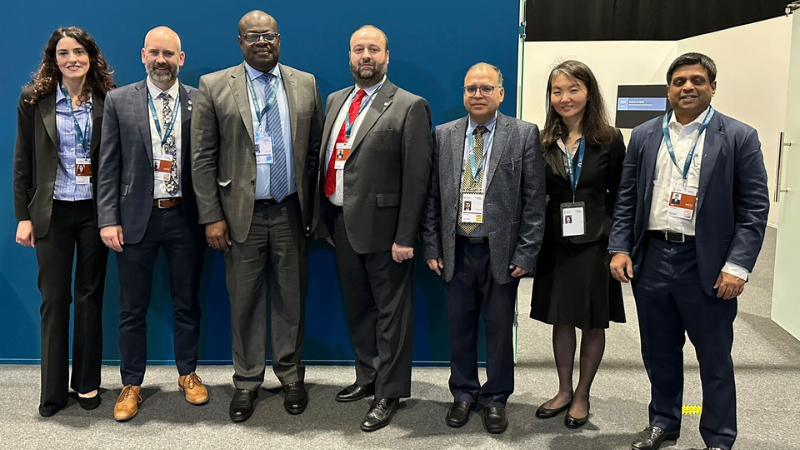At the 13th WTO Ministerial Conference, the WFO Delegation advocated for a fair, transparent, and predictable trading environment that reflects farmers’ needs.
From February 26 to 29, a high-level delegation from the World Farmers’ Organisation (WFO) attended the 13th Ministerial Conference of the World Trade Organization (WTOMC13) in Abu Dhabi to engage in the conference’s happenings and follow agriculture negotiations.
The WFO delegation included Secretary General Dr Andrea Porro and Ms Ambra Raggi, WFO Member Engagement Manager, together with experts and leaders from our member farmers’ organisations, the Canadian Federation of Agriculture, the MTK Central Union of Agricultural Producers and Forest Owners, Norges Bondelag, Schweizer Bauernverband, and United Farmers Front. Their agenda was packed with several meetings, including a significant conversation with Edwini Kessie, Director of the WTO Agriculture and Commodities Division.
Central to their advocacy action was the WFO MC 13 Statement, a strong appeal issued by WFO ahead of MC13 for agriculture negotiations to respond effectively to global challenges food and agriculture systems face, recognise the role of farmers, acknowledge their needs and experiences at local level, strengthen their position in the food chain and ensure the global population’s food security.
Despite intense and stressful negotiations during MC13, again WTO members could not reach a consensus on agriculture. Divergences remained on public stockholding (PSH) for food security purposes, timelines, expected outcomes, and the scope of flexibility to be provided to food imports by the most vulnerable countries from export restrictions. Negotiations will likely continue on both agriculture and fishers in Geneva.
However, there were formal outcomes in the following areas:
- New disciplines on services domestic regulation;
- The adoption of a Ministerial Decision to extend the moratorium on non-violation and situation complaints regarding the Agreement on Trade-related Aspects of Intellectual Property Rights (TRIPS) until MC14;
- The adoption of a Ministerial Decision recognizing the progress made with the view to having a fully and well-functioning dispute settlement system accessible to all members by 2024;
- The adoption of a Ministerial Decision to review special and differential treatment (S&DT) provisions for developing and least developed countries (LDCs);
- A Joint Ministerial Declaration marking the finalization of the Investment Facilitation for Development (IFD) Agreement
WTO DG Okonjo-Iweala recalled that this has been in the works for over two decades. “At MC12, we couldn’t even agree on a text. Even though there are challenges, for the first time, we have a text. We couldn’t finish the work on it here. So let us get back to Geneva and deliver,” she optimistically stated.
Looking beyond the 13th WTO Ministerial Conference, reinforcing the global agricultural trading system is not a matter of choice but a necessity. WFO is fully committed to advocating for strengthening international standards, eliminating unlawful protectionist measures, capacity building for underrepresented and vulnerable groups, investing in trade infrastructure, improving transparency, and ensuring a trading system where farmers benefit fairly, and governments prevent the abuse of market power. Detailed policy recommendations are outlined in the WFO Policy on International Trade.

